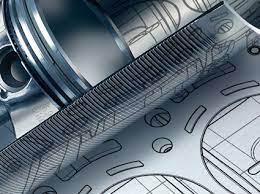The role of modern manufacturing technology in reducing wear and extending the life of diesel engine piston rings is represented by several key points:
· High manufacturing precision: Modern manufacturing technologies such as computer numerical control (CNC) and automated systems enable the production of piston rings with very precise dimensions and without defects, reducing unbalanced friction and preventing premature wear.
· Improved material and coating quality: Technology enables the use of improved materials and advanced heat treatments, as well as friction- and corrosion-resistant coatings (chromium, nickel, etc.), which enhance the piston's resistance to heat and mechanical stress.
· Intelligent monitoring and inspection systems: The use of sensor technologies and artificial intelligence in production lines ensures the detection of defects and problems before final manufacturing, improving product quality and extending product life.
· Advanced designs: Technology enables the manufacture of multi-piece piston rings with sophisticated designs that help distribute force and reduce local stress, reducing wear and increasing efficiency.
· Reducing waste and improving compatibility: Modern production reduces material and time wastage and ensures better compatibility between the piston rings and cylinder walls, reducing wear on both surfaces and improving service life.
In short, modern manufacturing technology increases manufacturing precision, improves materials and coatings, uses intelligent monitoring, and adopts advanced designs. All of these factors lead to reduced piston wear, increased lifespan, and improved overall diesel engine performance.
Yes, advances in diesel engine piston manufacturing technology directly lead to reduced maintenance costs and improved engine efficiency for the following reasons:
Improved material quality and manufacturing precision reduce piston wear and gas and oil leakage, extending piston life and reducing the need for frequent maintenance.
The use of modern injection and cooling technologies positively impacts the distribution of pressure and heat within the engine, reducing friction and damage within the cylinder, thus improving combustion efficiency and engine performance.
Advanced designs and friction-resistant coatings contribute to reducing losses due to friction and piston wear, keeping the engine running smoothly and reducing oil and fuel consumption.
High manufacturing quality and efficient cooling contribute to the smooth operation of engine components and reduce unforeseen breakdowns, reducing downtime for maintenance and saving repair costs.
In short, the better the piston manufacturing technology—in terms of materials, precision, coating, and heat treatment—the longer the piston's lifespan and improve engine efficiency while reducing maintenance and service costs. This positively impacts the economic and operational performance of diesel engines.

